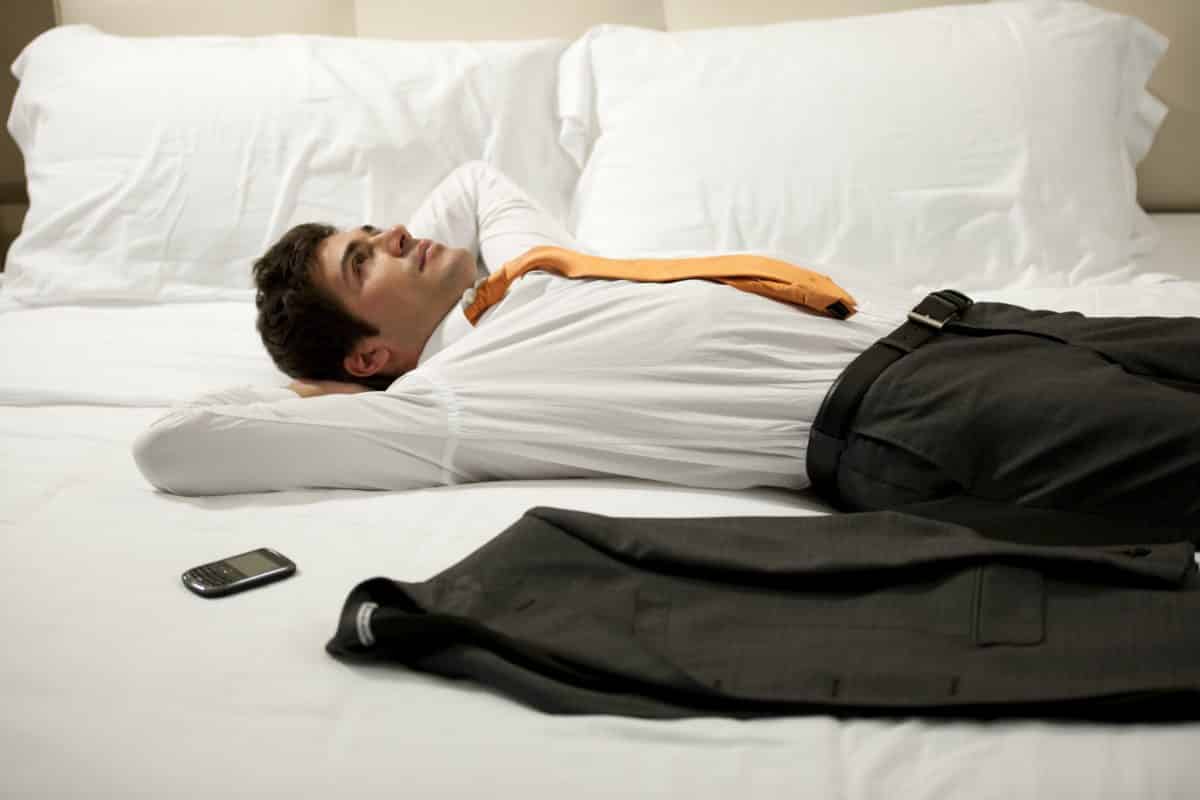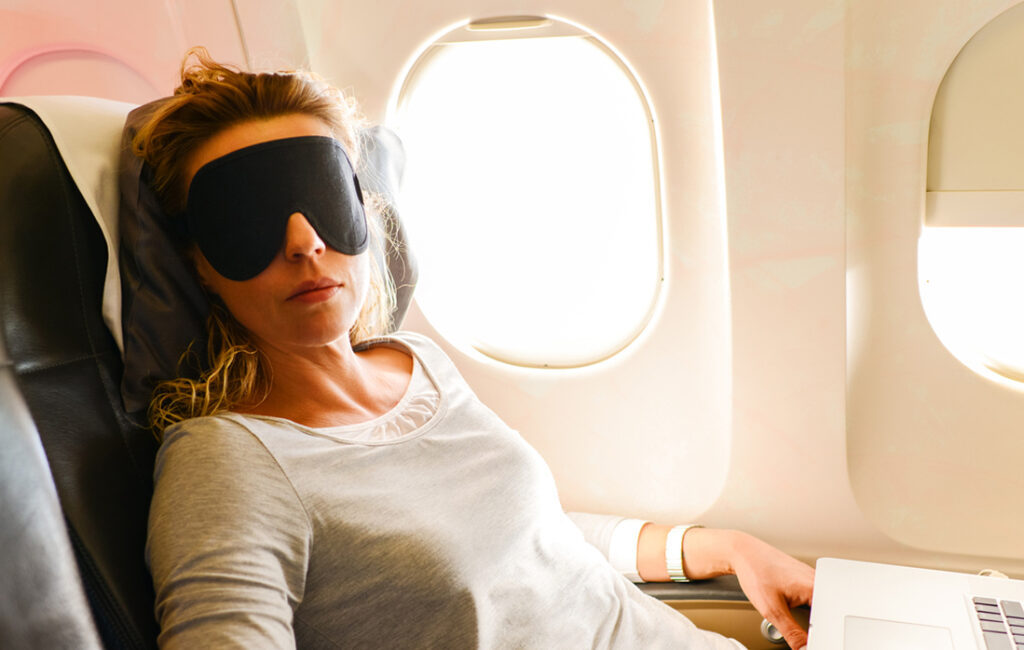Hopping on a plane to head to another time zone can be fun and exciting, but it can also have an unwanted side effect: jet lag.
Jet lag has the potential to cast a shadow on any trip, whether that’s an important business trip or the vacation of a lifetime. And once people are home again, adjusting to their usual schedule can take longer than they bargained for.
Jet lag leads to tiredness during the day and alertness during the night, which can make life uncomfortable. Luckily, there are ways you can combat jet lag for a more comfortable traveling experience. Here you’ll find all the information you need on how to beat jet lag.
What Is Jet Lag?

Jet lag is something that happens when someone travels through a couple of time zones (generally three or more). The traveler’s personal body clock is no longer in sync with the right time zone, causing them to feel tired during the day and alert during the night.
Signs and Symptoms of Jet Lag
The symptoms of jet lag are mostly related to sleep, such as fatigue during the day and an inability to sleep during the nighttime. In milder cases, it can also cause individuals to wake up a couple of hours too early because their body has not synced correctly with the new time zone.
But not all jet lag symptoms are sleep-related; some people experience nausea or diarrhea and generally feel a bit unwell. Because of changes in sleep habits, some people also experience sudden changes in mood.
How Long Does Jet Lag Last?
The length of time you experience jet lag often depends on how many time zones you crossed during your travels. But rest assured, it shouldn’t last more than a couple of days before your body readjusts.
How to Prevent Jet Lag
There are a couple of tactics that you can use to prevent jet lag before traveling, which will make your experience a little more pleasant.
Adjust Your Sleep Schedule Gradually
Gradually adjusting your sleep schedule before the trip can help ease you into the new time zone with less of a struggle. As a general rule, if you are traveling in a westerly direction you will need to go to bed a little later than your usual bedtime, while if you are traveling east, you will need to go to bed earlier.
You can try to adjust your bedtime by an hour each night for a couple of days before you depart to make the transition easier. Using an app like Timeshifter can help you a lot with this transition by preparing you thoroughly before taking the flight.
Get a Good Night’s Rest the Night Before You Leave
Getting a good night’s sleep before you leave can help make this transition easier. If you have a good night’s rest behind you, then staying up a little later the night you arrive won’t be a problem. This is especially effective if you are traveling west.
To ensure a good night’s sleep, make sure you have a comfortable mattress and the room is at the right temperature. This will ensure that you get a deep sleep the night before your big flight.
Sleep on the Plane According to your Final Destination’s Time Zone
Sleeping on the plane in accordance with your destination’s time zone can also help your body clock to adjust more quickly once you have landed. For those that love to sleep on the plane, this might mean you need to exercise restraint and remain awake for a certain portion of the flight. And for those that struggle to sleep on a plane, it could mean having to self-medicate to induce sleep at the correct time.

How to Beat Jet Lag
While preparation can help to ease the discomfort of jet lag, you won’t always have the pleasure of an adjustment period before your flight due to prior engagements. These are some tactics you can use for beating jet lag once it has already set in.
Take It Easy Your First Day or Two
Don’t fill up your entire itinerary from the moment you land at your destination. Instead, try to take it easy for the first couple of days and ensure that you are getting a good night’s rest while away from home.
Limit Alcohol and Caffeine
Alcohol can have a negative impact on your sleep cycle because it affects the quality of your sleep, leaving you feeling fatigued and sluggish during your waking hours. Caffeine can also affect your sleep by making it harder to fall asleep, leaving you with too little quality sleep during the night.
It’s best to avoid both caffeine and alcohol a couple of days before, during, and after your flight. This will minimize sleep disturbance or loss caused by jet lag.
Stay Hydrated
Dry cabin air can lead to dehydration, worsening the effects of your jet lag. To counteract this, ensure that you drink plenty of water before, during, and after your flight.
Bring Travel Sleep Accessories
To ensure that you are getting enough rest during your flight, bring accessories that will make your journey more comfortable. A travel pillow, sleep mask, and earplugs can make the flight a much more pleasant experience.
Regulate Your Circadian Rhythm with Sunlight
Exposure to light can affect your sleeping patterns in a really big way. While light exposure is usually disruptive because of the amount of blue light in our environment, it can be a helpful way to manipulate your body out of a jet-lagged state.
If you are traveling to the east, expose yourself to light earlier in the morning to adapt to an even earlier time zone. While traveling west, you will need to do the opposite, exposing yourself to light later into the evening to adapt to a much later time zone.
RELATED: The Ultimate Guide to Your Circadian Rhythm
Avoid Daytime Naps
While napping can be good for you, it’s best to avoid daytime napping when you are feeling jet-lagged. If you nap for too long of a period, or nap too late into the day, it can further throw off your sleep cycle, leaving you feeling even more jet-lagged the following day.

Enjoy Lighter Meals that Energize and Nourish You
The way you eat can affect your sleep cycle, so it’s important to take diet into consideration when adjusting to a new time zone. Eating lighter meals rather than three big meals a day can prepare your body for the change in time zone. Ensure that each meal you eat is high in nutrients, and avoid highly processed foods that are high in sodium, as these can exacerbate feelings of dehydration and jet lag.
Resume Your Normal Schedule When Returning Home
Many people find it more difficult for their bodies to adjust when traveling home, as it is the second time in a brief period that the body is having to readjust. In order to combat this jet lag, return to your normal schedule and routine as soon as you get home so that your body feels a sense of normality.
Best Sleep Aids for Jet Lag
Telling your body to sleep when it just wants to be awake is easier said than done, but taking sleeping aids can help you to fall asleep more easily. Before taking any sleeping aid, speak to your medical provider to ensure health and safety.
Melatonin
Taking a melatonin supplement for sleep can help to regulate your body’s sleep cycle by indicating when it is time to wind down for the day. It’s not recommended for long periods of time, but using it for short bursts to adjust to a time zone shouldn’t cause any harm.
RELATED: Can You Overdose on Melatonin?
Magnesium
Magnesium can help you sleep, but it is also known to increase the quality of your sleep, helping you to feel more rested in the morning. Taking a magnesium supplement 30 minutes before bed can help you get better rest during the night.
FAQs
What does jet lag feel like?
Jet lag manifests in unpleasant symptoms such as daytime fatigue, an upset stomach, and an inability to fall asleep at night.
How long does jet lag last?
Jet lag doesn’t last very long, especially if you prepare for it before your journey. At the most, you can expect to experience jet lag for a few days.
Is jet lag worse going east or west?
Jet lag tends to be a little worse when you are traveling east because it means you will lose time and need to go to bed early, rather than delaying your sleep time as you would when traveling west.
Can jet lag cause a fever?
No, jet lag can make you feel tired and out of sync, but it cannot cause a fever. If you are experiencing a fever then you could be coming down with a virus of some sort.
Can you get jet lag from driving?
No, you can’t get jet lag from driving in the car because you would not be able to cross time zones fast enough for it to happen. However, spending long periods of time in the car can make you tired, but this is travel fatigue rather than jet lag.
Do jet lag pills work?
Medications can be used to help you sleep according to your new time zone, however, it may still take one or two days to feel completely normal.

